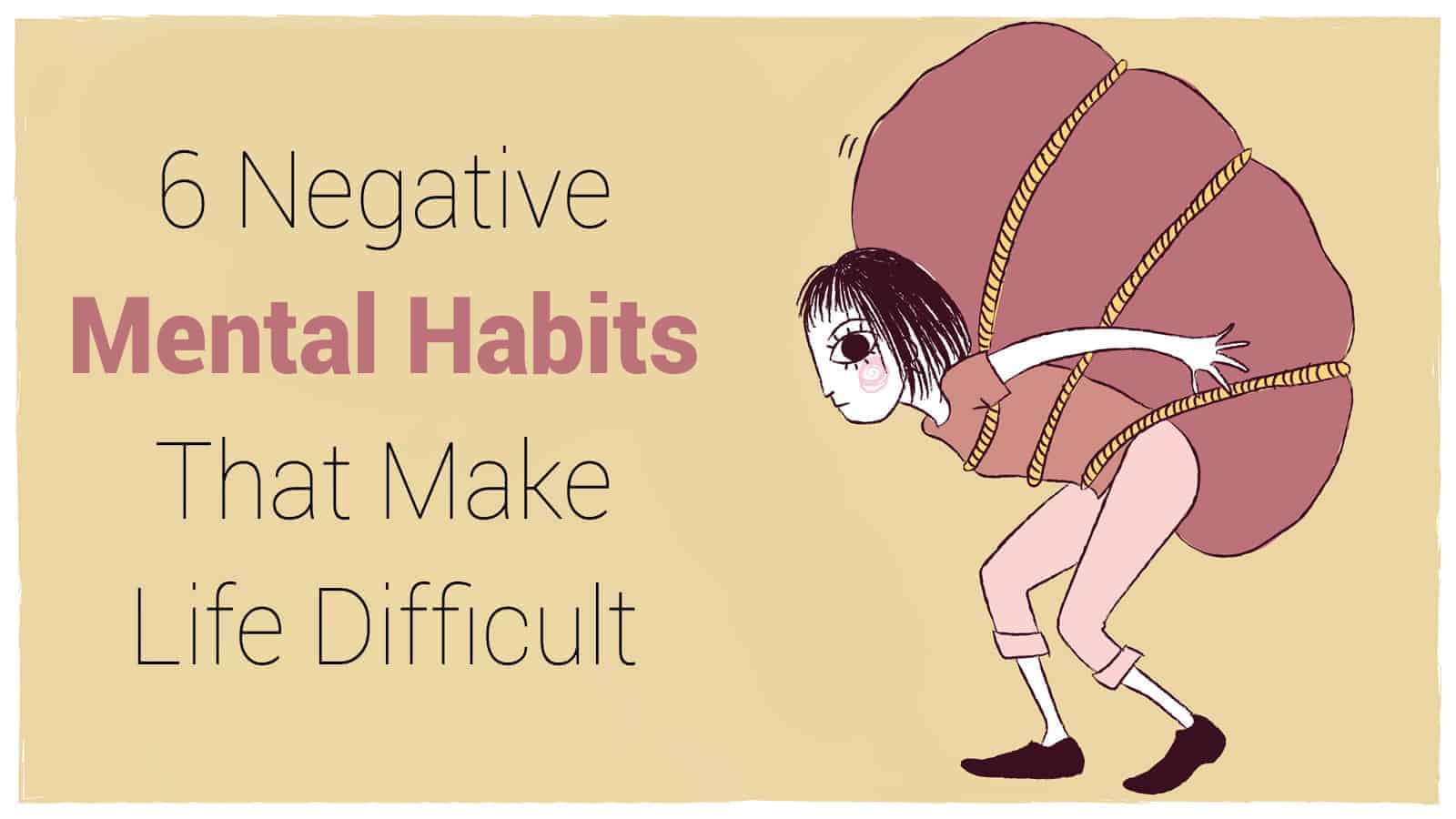Few people want their life to be complicated. And yet, sometimes, the very things that are the biggest hindrance in your life are the mental habits that you perpetuate yourself. It’s a tough pill to swallow, but it’s true for so many!
The human mind is mighty. Everything you do, say, feel, and believe has its roots up there. Its power is so great that its subconscious machinations can be enough to turn your life upside down!
This means that bad habits that you perform mentally can be even more damaging than those you perform physically. So the things that happen in your brain could be the primary source of many of your struggles in life! Here are six negative mental habits that make life difficult.
1. Perfectionism (one of the most common adverse mental habits)
The root word “perfect” in perfectionism sometimes makes people believe it can be a positive trait. It can be necessary for jobs where work is highly detail-oriented, but it’s ultimately destructive for you, say studies.
This is because the desire for perfectionism is unachievable. There’s no natural way for any human being to be perfect. Even the people who seem almost robotic in their success have their bad days and make mistakes. To want perfection is to like the impossible, and it leads to the following negative mental habits:
- Overly high expectations of others, which breeds resentment
- Excessive concern over the judgment of others and how they view you
- Obsessions over obtaining specific goals that ultimately don’t feel fulfilling
- Higher levels of anxiety, depression, and their symptoms
- Inability to move past mistakes or learn from previous unfavorable events
- Failure to roll with the punches when things don’t go to plan
- Unreasonable expectations for yourself that you will never be able to meet
- Decreased self-esteem due to aforementioned unmet self-expectations
Why being a perfectionist is so harmful
Perfectionism also has more readily visible and unwanted effects on health. This harmful habit of the mind can damage physical wellbeing by making you more susceptible to:
2. Guilt, One of the Mental Habits That Can Cause Negativity to Enter
There are many different forms of guilt that you may experience in life. Most of them are harmful negative mental habits that you should release. These destructive forms of guilt are caused by these things:
- Having more secure finances, better relationships, or more comfortable living standards than your loved ones.
- Not doing enough things to help others or about not being sufficient for others in your life.
- The thoughts and emotions that you have successfully managed and never acted on.
- The act that you’re experiencing negative feelings even though others in the world have it worse than you.
- Something you could not control.
- Taking care of yourself (which is one of the most positive mental habits).
These types of guilt ultimately harm your self-esteem and are entirely counterproductive. They suck the positive thinking out of life and put you in a battle against an invisible enemy. You can’t win these fights, and this guilt doesn’t serve you in any way. You should be using those emotions and turning them on its head for positive momentum!
There is one form of guilt that can be more helpful: remorseful guilt over your mistakes. That kind of guilt can help to motivate you to make amends, learn, and improve. But there’s a point where that guilt becomes counterproductive, too. If the responsibility leads to no long-term growth or improvement, it’s a harmful habit, and it’s harming your life!
3. People-Pleasing
Wanting to make others happy is a noble cause. But striving to please everyone around you is a destructive and one of the most harmful mental habits. This kind of behavior involves:
- The desire to do anything possible to make everyone like you.
- A lack of boundary-setting leads to feelings of discomfort.
- The development of numerous unhealthy relationships and attachments with toxic individuals.
- Constantly worrying about what people will think.
- The overvaluing of external opinions of others and a lack of interest in developing your own.
- Feelings of responsibility towards the thoughts and emotions of others that have nothing to do with you.
- The misuse of healthy empathy into an unhealthy trait.
- The constant need to use your energy, time, and resources for others, even when you need some for yourself.
- Self-sacrifice for the sake of the comfort of others.
- The development of self-esteem is entirely dependent on other people.
- A desire to avoid other people altogether to avoid upsetting them.
- The overthinking of other people’s actions, expressions, statements, behavior, and mental habits.
- An oversensitivity to rejection.
- The inability to properly prioritize oneself in any given situation.
- The development of resentment as you feel mistreated by those who take advantage of your people-pleasing tendencies.
- Feeling emotionally drained due to the constant need to abide by all these rules.
Where does people-pleasing come from?
People-pleasing behavior is often entrenched in trauma or an unhealthy childhood environment. This is why it can be such a difficult habit to leave behind. Research shows that adults who survived abuse as children had to learn hypervigilance to survive. You may have needed to constantly be on your toes to please your guardian or parents figures to avoid mistreatment.
Whether or not your people-pleasing behavior is rooted in such trauma, the fact is that it’s unhealthy. You’ll damage your future relationships, feel constantly exhausted, and won’t develop healthy self-esteem. It would help if you learned to feel comfortable putting yourself first, setting boundaries, and finding value in your intrinsic desire over other people’s.
4. Catastrophizing
Catastrophizing is the act of imagining the worst-case scenario as an outcome for every event. It’s a highly pessimistic prediction that means you get stuck in what-ifs. You lose yourself to rumination and anxiety over all the worst “what if”s you can think of.
This overthinking can often form a self-fulfilling prophecy. The more you believe the worst will happen, the more likely you are to invite it inadvertently. For example:
- If you think you’ll do poorly at work, you might decide there’s no point in trying, so you do perform poorly. Or you might get so distracted by anxiety that it results in poor performance.
- If you think your date will hate you, you’ll pretend to be someone you’re not and come across as inauthentic. Or you’ll shoot yourself in the foot by being so nervous that you say and do all the wrong things.
- If you think you’ll mess up a presentation, you might be so distracted by the stress that you stumble over all your words. Or you might end up playing it so safe that you do an unremarkable job.
Indeed, the mind is a powerful thing. Its negative habits can often show themselves in reality if you fail to get them in check. When you catastrophize, you become your own worst enemy, and that kind of self-sabotage can ruin your life!
5. Bottling Up Negative Emotions Can Cause Poor Mental Habits to Snowball
Negative emotions are a part of life. They can be challenging to deal with, so learning to manage them healthily is so important. Unfortunately, a widespread bad mental habit is the bottling up of these feelings. Since they’re so painful, you don’t want to experience them. So instead, you shove them down and try not to think about them.
This emotional repression is terrible for your life. Studies have been pretty clear about how lousy repression of this kind is for your mental and physical health. You see, these emotions don’t just go away – they remain in your mind, where they can build up and fester.
This can lead to problems like the following outcomes:
- Constantly feeling anxious, worried, depressed, or stressed.
- Regularly feeling numb, blank, or empty, sometimes to the point of complete apathy and indifference.
- Becoming uncomfortable when others tell you about their emotions or experience their own negative mental habits around you.
- Refusing to express personal needs or opinions.
- Becoming annoyed or angry when others ask you about how you feel.
- Increased instances of forgetfulness.
- Lashing out at those who don’t deserve it when the emotions finally cannot be contained anymore.
- Explosive fits of extreme emotions to mild or unimportant issues due to emotional buildup.
- Passive-aggressive behavior towards situations that trigger emotions you want to bottle up.
- Increasing feelings of resentment towards those who may have caused some of your negative emotions.
- Inability to process and manage complex events or emotions, causing stagnant personal growth.
- A heavy and unhealthy dislike of being alone with your thoughts and feelings.
- Repetitive occurrences of the same problems, mistakes, and dire situations.
- Substance abuse to help the management of unwanted emotions.
When you don’t process your emotions in the long term, they manifest as various psychological symptoms. These symptoms can develop into mental illnesses or even become a contributing cause for physical ailments. You’ll also experience worsened relationships with others and lose self-compassion as you go. Human brains need these feelings to be resolved. It’s inherently harmful to your life if you never fix them.
6. Fearing Failure
There’s a pretty famous quote: “Failure is a stepping stone to success.” It’s a little overused, but it’s true! Not only does a fear of failure have the same effects as catastrophizing, but it also goes beyond that. When you’re afraid of failure, what happens is that you never progress. This is because you might do these things:
- Refuse to take risks, even if they’re very well-calculated.
- View each failure as a symbol of wasted effort or time.
- Do not learn and grow from past failures to increase future chances of success.
- Never leave your comfort zone, closing you off to future opportunities.
- Don’t get to experience anything new.
- Aren’t able to grow your resilience and self-belief, as you haven’t seen proof of your capabilities.
- Develop unhealthy self-esteem that fails to see its strengths.
- Quit or give up before you can see any results.
Yes, failure can be scary. But if you never step into its risk with positive thinking, your mental habits are stunting your life and growth. The sooner you accept that failure is a part of healthy, long-term success, the better!
Final Thoughts On Some Negative Mental Habits That Make Life Difficult
Bad habits are always destructive, but some are more dangerous than others. Negative mental habits that live in your mind can take over your life and make it more difficult in tremendous ways. So understanding those habits can be the first step in breaking them and replacing them with something more positive!

















 Community
Community

